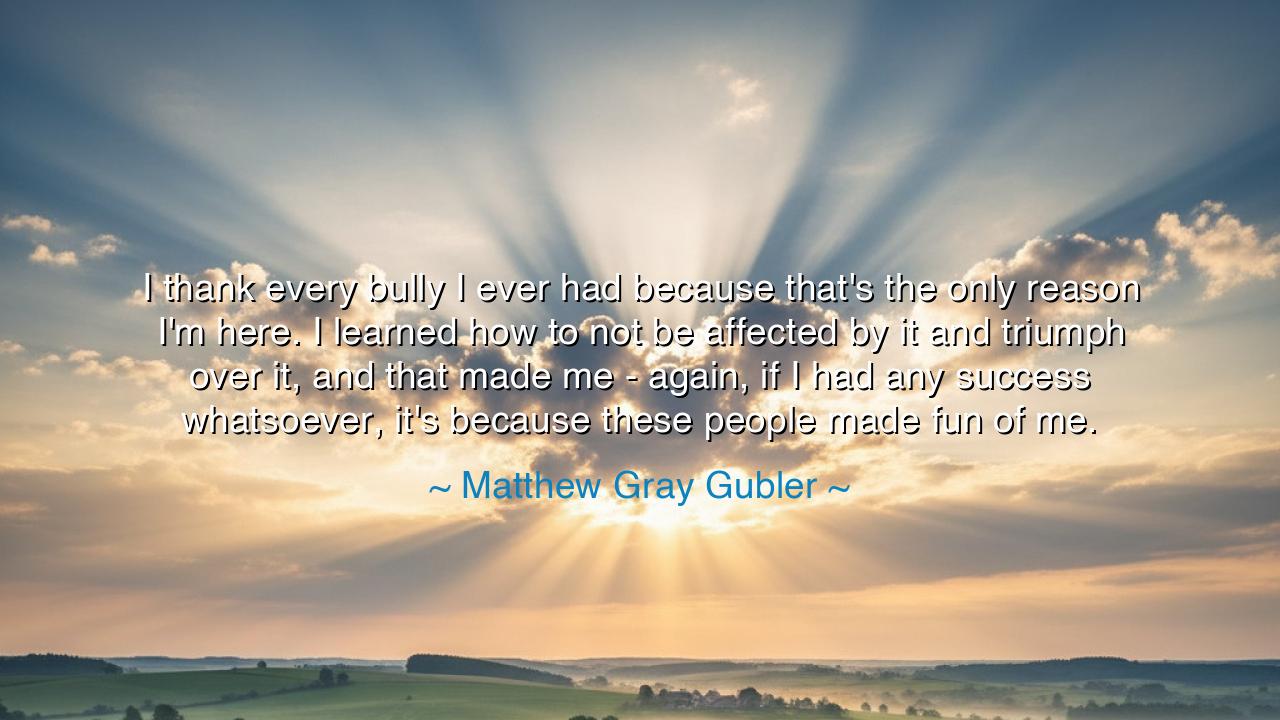
I thank every bully I ever had because that's the only reason
I thank every bully I ever had because that's the only reason I'm here. I learned how to not be affected by it and triumph over it, and that made me - again, if I had any success whatsoever, it's because these people made fun of me.






Hear the voice of Matthew Gray Gubler, who spoke not with bitterness, but with gratitude: “I thank every bully I ever had because that's the only reason I'm here. I learned how to not be affected by it and triumph over it, and that made me—again, if I had any success whatsoever, it's because these people made fun of me.” These words are a hymn to resilience, a testimony that cruelty, though sharp and wounding, can forge within us a strength more enduring than gold. For Gubler proclaims that the scorn of others became his teacher, and from the fire of mockery, he was tempered into unbreakable steel.
The ancients too sang of this paradox: that the trials meant to destroy often create the strongest souls. Consider Hercules, who was tested with impossible labors, each designed to break him. Yet it was through these trials that his glory was born. Or think of Odysseus, mocked, opposed, and delayed at every turn; yet it was precisely these hardships that gave him the cunning and patience to reclaim his home. Just as the hero triumphs not despite the obstacles, but because of them, so Gubler declares that his success sprang not from ease, but from adversity.
There is a deep wisdom in thanking the bully. For to thank one’s enemy is to show that their power has been overturned. The wound they sought to inflict has instead become a source of strength. This is the alchemy of the human spirit: turning cruelty into courage, insults into fuel, mockery into mastery. By saying, “I thank them,” Gubler claims victory over their intent, showing that he was not broken, but transformed.
History offers us the story of Abraham Lincoln, who was derided as awkward, mocked for his rough manners and homely looks. His rivals in politics sneered at his background and belittled his intelligence. Yet Lincoln endured. He sharpened his wit, strengthened his resolve, and grew into one of the greatest leaders the world has known. The very scorn meant to diminish him became the pressure that shaped his greatness. In this way, his life, like Gubler’s, demonstrates that hardship and humiliation can become unexpected gifts.
But this teaching is not meant to glorify cruelty—it is meant to glorify the response. The bully is no hero; the hero is the one who refuses to let the bully’s cruelty define them. Gubler’s triumph lies not in the existence of mockery, but in his refusal to be conquered by it. He learned the ancient art of resilience: to let words fall without piercing, to turn pain into purpose, to rise above those who sought to drag him low. This is the secret: the true victory is inward, the conquering of the self, until one’s spirit is beyond reach of harm.
The lesson is clear: when faced with mockery, rejection, or cruelty, you have two choices—either to be diminished by it, or to be strengthened through it. If you accept their words as truth, you will carry chains. But if you transform their words into fuel, you will forge wings. Every insult can become a stepping stone; every wound can become a scar of honor. Gubler’s gratitude is not for the cruelty itself, but for the strength he discovered in learning to overcome it.
Practical wisdom follows: when you are mocked, do not ask, “Why me?” but instead, “How can I grow from this?” When you are rejected, remind yourself that rejection is not the end, but redirection toward a path of greater strength. Hold firm to your inner worth, for no insult can take it from you unless you surrender it. Keep a record of your struggles, and let them remind you of how far you have already triumphed.
So let the words of Matthew Gray Gubler be remembered: “If I had any success, it’s because these people made fun of me.” This is not the boast of a man who sought vengeance, but the wisdom of one who transformed wounds into wisdom. It is the eternal teaching of resilience: that suffering can either chain us or free us. Children of tomorrow, choose freedom. Let the arrows of mockery pierce not your heart, but your armor of resolve, and you too will rise in triumph over those who sought to hold you back.






AAdministratorAdministrator
Welcome, honored guests. Please leave a comment, we will respond soon